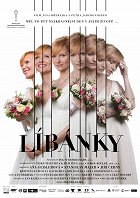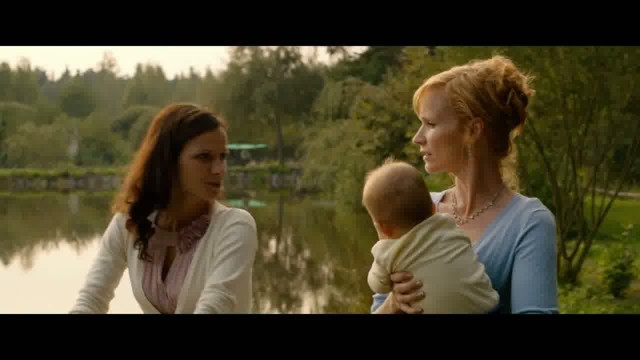Regie:
Jan HřebejkDrehbuch:
Petr JarchovskýKamera:
Martin ŠtrbaMusik:
Aleš BřezinaBesetzung:
Aňa Geislerová, Stanislav Majer, Jiří Černý, Kristýna Badinková Nováková, David Máj, Jiří Šesták, Jana Radojčičová, Matěj Zikán, Vlastimil Dušek (mehr)Inhalte(1)
Psychological drama Honeymoon concludes a film trilogy – together with two previous Hrebejk's films Kawasaki's Rose and Innocence. The common theme of the three films is a reflection about guilt from past and the possibilities of forgiveness. The intimate story of Honeymoon takes place during one afternoon, night and next morning at a family cottage, where an uninvited guest disrupts a wedding celebration. The story is conceived as a metaphor for social (im)possibility of getting over a tragic past. (Verleiher-Text)
(mehr)Kritiken (9)
Ein gespanntes Drama über Schuld, Verantwortung und Schatten aus der Vergangenheit, die Sie einmal einholen werden. Psychologisch sorgfältig aufgebaut, mit nur einem oder zwei Momenten, bei denen der Schnitt nicht gut ist (d. h. WTF-Augenblicke). Man ist sich nie sicher, was die Wahrheit ist, was und in welchem Ausmaß beschönigt wurde und wer der Schuft oder der Märtyrer ist. Der Film wird durchlaufend durch die Figur vom Ehemann der Schwester sympathisch entspannt, der, wenn er betrunken ist, lieber auf dem Klo als im Bett schläft.
()
And here it goes again! Once again I came across a Czech movie that really knocked my socks off with how good it was, but when I came to Filmbooster what knocked my socks off were the other users here. The worst part is that from reading the czech reviews here, I didn’t find a single reason why Honeymoon should have gotten such a negative score. Where are all the bad reviews? In my opinion, Honeymoon is a pretty brutal psychological movie, which reminded me mostly of Scandinavian dramas. I admit that it could have been a lot more brutal, but on the other hand, everything is made up for by the excellent acting performances, where the actors make sure that you know what to think about their character. Other than Geislerová’s character, which seemed a bit unfinished to me after I saw the movie. But everything is made up for by the visual ending, which proves that the director of photography is the man. Honeymoon might be a chamber drama, but it has no problems mesmerizing you with its human roughness, which is something I don’t see in Czech movies very often to be honest.
()
Es ist ein weicheglättetes und dreifach übergetrocknetes Das Fest mit unglaublich stupiden beschreibenden Monologen und Perlen vom Typ "Wir haben uns ineinander versteckt". Die einzige Unsicherheit des Filmes besteht darin, dass einige der Charaktere von Buchrezitaten zu starren Gesprächen übergehen. Psychologie? Lächerlich. Triers letzte Exploatation, die über die Grenzen von allem hinausgeht. Eine Kakophonie der ästhetisierten Tragödie, worunter es ein schwarzes Loch vehementer Bemühungen gibt, sich im pathologischen Tümpel menschlicher Beziehungen irgendwohin zu bewegen. Es ist nicht nur so, dass die Drehbücher des tschechischen Autoren Jarchovský zu viel des Guten wären, unnatürlich sind und zerbröckeln (obwohl man hierin theoretisch logische thematische Einheiten, Kontexte und Absichten zu rekonstruieren vermag, den Betrachter wachzurütteln), sondern dass Hřebejk anstelle von Höflichkeit einen sinnlos pompösen Stil wählt, welcher die Dürftigkeit noch hervorhebt. Seinen Filmen mangelt es gar nicht an Ambitionen und potentiell an einem Weltlook, sondern es fehlt ihnen bis zum Verzweifeln die Fähigkeit, zu den Charakteren anders zu gelangen als mit visuell und verbal Explizititem. Entschuldigung, dieses Fake hat mich zutiefst beleidigt. [30%]
()
The dialogue was at times so silly you couldn't possibly say it, the acting unconvincing for the camera – it would have worked in the theatre and there would have been ovations, but it didn't fit a film. A good nibble here and there and you get the feeling that’s how it would happen and it all feels natural, but then it's broken up by bad acting or moronic dialogue. Here and there a nice image, but this film is not artistic... where is Czech cinema headed? :-D
()
Der Film wirkt, als ob seine Schöpfer versuchen würden, einen B-Movie-Thriller der 90er Jahre zu machen, was nicht ganz im Einklang mit Hřebejkova's Poetik der humorvollen Nebenfiguren steht. Der seltsame Mix aus Komödie und Drama überlebt dank der Kameraarbeit und der großartigen Schauspieler. Eine starke Geschichte, eine sinnvolle Handlungskonstruktion und vor allem der entscheidende Punkt fehlen jedoch. Eher eine Enttäuschung über vertane Chancen.
()
Das war was, und ich habe kein Problem damit, Honeymoon als kleine tschechische Variante auf Vinterbergs Das Fest zu bezeichnen. Das Erste, was ich hervorheben muss, ist die famose Kameraführung von Martin Štrba, die umso mehr durch die wunderschöne Szenerie betont wird. Des Weiteren die hervorragenden Leistungen von Černý, Geislerová und Majer. Und nicht zuletzt das Drehbuch und die Musik. Nicht gefallen hat mir wahrscheinlich nur die abschließende zu starke Bildtreue. Das kann jedoch meine Meinung insgesamt nicht ändern. Die letzten drei Filme von Hřebejk sind einer besser als der andere, auch wenn man nichts besonders Positives mitnimmt. Wie mochte ich ihn doch vorher nicht, jedoch eher wegen seiner arroganten Meinungen, als Kuschelnester in den Augen der Kritiker Die Rückkehr des Idioten in den Schatten stellte. Doch als Regisseur ist er wirklich hervorragend. Da ich im Theater Rubín Icing gesehen hatte, ist mir klar, dass wir uns auch 2014 auf etwas freuen können. Und die hiesigen Bewertungen verstehe ich nicht so ganz, aber das tue ich auch bei anderen tschechischen Filmen nicht.
()
When I was about 8-14 years old, I suffered from the fact that whenever something on TV appealed to me and I thought it was cool or importantly adult, without usually understanding what the movie was about, I would store various sections of the movie and its atmosphere in my mind and try to replicate them in my own work. That's how I remember when I was writing a story about a ritual killer on the streets of old Prague whose motivations date back to Nazi times (we had Se7en on tape, which I had ultimately ripped off, as did The Crimson Rivers) or a short story about how a mysterious figure returns to a remote village at the beginning of the last century and disfigured bodies start appearing in the fields (I had seen the trailer for Sekal Has to Die and the grim faces of the villagers in the middle of the suspiciously golden fields made it clear that the plot just needed a few disfigured corpses, plus I thought the title was cool). I consider the masterpiece to be an action story created after I'd seen Die Hard 3, which culminated in a scene where, during a fiery speech by the Prime Minister, a barrel of special chemical fluid flies through the window on either side of his lectern, and when they combine together they explode horribly. (...go ahead and laugh; what Netflix would give for that these days). Yeah and then you have the forty-three year old Jarchovský – a renowned, Czech Lion-winning screenwriter who has just seen a Nordic Drama (tm) and started waving his little hands and yelping while the credits are still rolling, and his wife knows immediately – she sticks a pen in one hand, paper in the other, and his big toe in his mouth so he can concentrate, and by midnight his work is finished. By morning Hřebejk has figured out that it has to be in a luxurious farmhouse under the cold orange lights of sunsets, sunrises, and decorative bulbs, so the peeling facade of idyll and better society can be seen. He automatically calls the last 6 numbers dialed to put together the cast and from that point on, God’s will be done. _______ There's something sadistically charming in knowing exactly what the actors are trying with comical urgency to achieve, how the director wants to be formally relevant, but still can't squeeze it out of the declamatory script, and ultimately you end up with some crazy scenes where a seemingly drunken pregnant Geisler screams at her newlywed husband in scripted fashion and a mega-important ten-minute close-up of the theater (not really film) actor Černý's face testifying that their kisses have always been salty from tears. I still have some sympathy for H+J here, because at least it's trying to be a bit naturalistic and unsettling for the Czech viewer, but surely there can be no worse combination than trying really hard at something intensely weighty only to end up dragging it into the ridiculous.
()
I can't help but think this film is extremely well constructed, where you have an almost uncomfortable sense of something terrible that could happen. This may not come to fruition in the way you expect, but the film is still quite gritty in its second half. This is where Hřebejk's mastery of gradually revealing what is important comes into play.
()
I have reservations about the final quarter of an hour, which is brought down by the weak script. Nevertheless, such a good psychological drama, captivatingly filmed by cinematographer Martin Štrba, would probably be hard to find in Czech cinema over the last ten years. A lot of credit for this goes not only to the quality direction of Jan Hřebejk but also to the convincing performances of the central trio. (75%)
()

